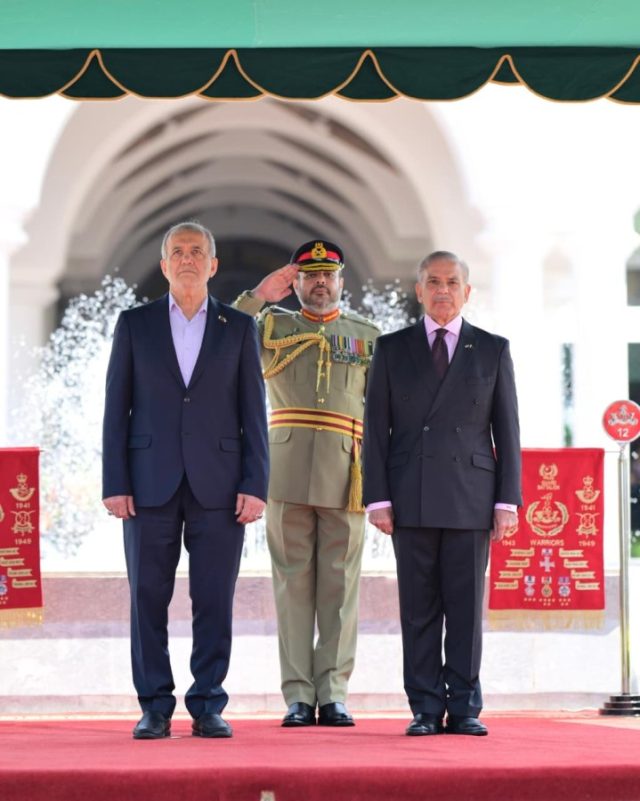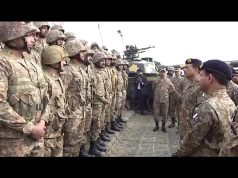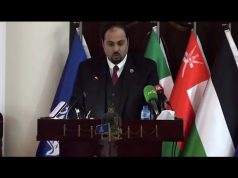By Rehan Khan
ISLAMABAD, Sunday, August 3, 2025 (WNP): Prime Minister Muhammad Shehbaz Sharif on Sunday received Iranian President Dr. Masoud Pezeshkian at the Prime Minister’s House, marking a significant chapter in the deepening bilateral ties between Pakistan and the Islamic Republic of Iran in a powerful display of regional solidarity.
The visit, President Pezeshkian’s first to Pakistan since assuming office, was rich in symbolism and substance. The Iranian leader was warmly welcomed with a guard of honour by a smartly turned-out contingent of the Pakistan Armed Forces. National anthems of both countries echoed across the PM House lawn, followed by introductions to federal cabinet members and Iranian delegation officials. In a gesture of environmental commitment and enduring friendship, President Pezeshkian also planted a sapling in the PM House garden.
This high-level engagement comes against the backdrop of shifting geopolitical dynamics in the region, particularly after the worsening of Pakistan-India tensions and the intensification of the Israel-Iran conflict. Both Islamabad and Tehran, historically bound by cultural, religious, and geographical ties, are now increasingly aligned in their strategic outlook and regional policy frameworks.
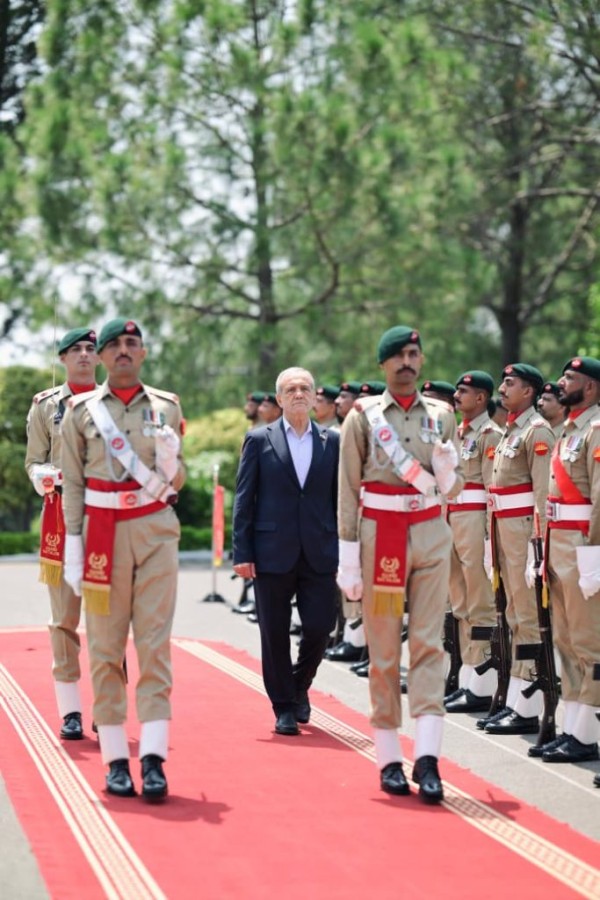
What began as traditional fraternal cooperation is now evolving into a calculated, multidimensional partnership for navigating shared regional challenges and maximizing mutual interests. The two countries are coordinating closely on key regional issues, with a renewed emphasis on joint strategy, mutual respect, and sovereignty.
One of the cornerstone achievements of this partnership is the significant enhancement in defense cooperation. Both nations have taken concrete steps to institutionalize intelligence-sharing mechanisms and improve coordination between their border security forces, particularly along the restive Balochistan-Sistan border.
Recent bilateral military talks have resulted in the establishment of a joint liaison framework to monitor and curb cross-border terrorism, human trafficking, and smuggling – issues that have long strained relations in the past. The new cooperation framework reflects a matured understanding between the security establishments of both countries and underscores a shared commitment to ensuring peace and stability along their shared frontier.
While security remains a priority, both Pakistan and Iran are looking beyond traditional diplomacy to forge an economically resilient future. Plans are underway to revitalize the long-stalled Pakistan-Iran Gas Pipeline Project, which could dramatically improve Pakistan’s energy security while opening new export avenues for Iran.
Moreover, the two sides have expressed determination to boost bilateral trade volumes through the development of cross-border economic zones, improved customs procedures, and a more streamlined banking and payment mechanism to bypass unilateral sanctions. The reactivation of the barter trade mechanism, alongside local currency exchanges, is also under serious consideration – steps that would insulate bilateral trade from international financial restrictions.
The expansion of transportation infrastructure, including the Zahidan-Quetta rail corridor and new road linkages, is expected to play a transformative role in connecting Pakistan’s Gwadar port with Iran’s Chabahar port unlocking regional trade potential that extends deep into Central Asia.
As two key players in the Islamic world, Pakistan and Iran share a long-standing vision for regional peace and non-interventionist diplomacy. Both oppose foreign occupation and unilateral actions that destabilize sovereign nations, and advocate for the resolution of conflicts through dialogue and international cooperation.
Their evolving consensus on regional issues including Afghanistan, Palestine, and the Red Sea signals an emerging joint diplomatic front that could shape the future of intra-Muslim state cooperation in the broader Middle East and South Asia.
President Pezeshkian’s visit is more than a diplomatic formality; it is a reaffirmation of an enduring brotherhood rooted in shared values, aspirations, and challenges. His meeting with Prime Minister Shehbaz Sharif has set the tone for a new era of pragmatic collaboration – one that blends historical affinity with forward-looking statecraft.
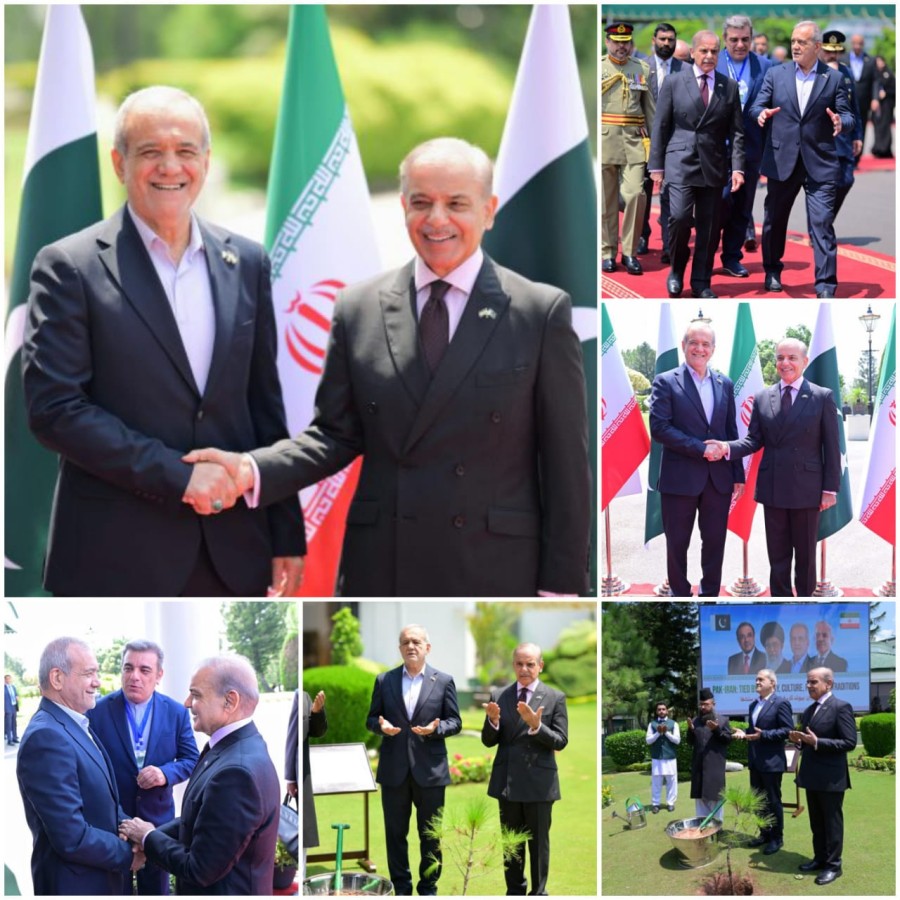
As global fault lines deepen and regional alliances recalibrate, the Pakistan-Iran relationship stands out as an example of how historical bonds, when guided by mutual interests and strategic clarity, can evolve into robust partnerships capable of shaping the destiny of nations.
In the coming months, both Islamabad and Tehran are expected to formalize several agreements in energy, trade, education, and counter-terrorism cooperation – further institutionalizing a partnership that is becoming central to regional balance and prosperity.

